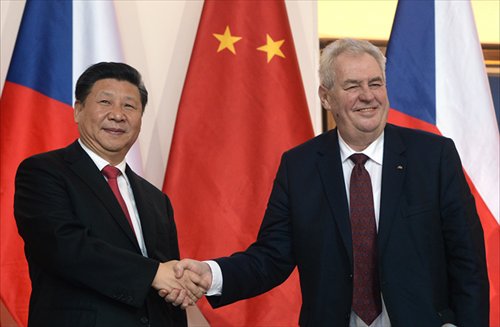Major deals inked in Prague
$4b in Chinese investment to enter Czech Republic 2016

Chinese President Xi Jinping (left) shakes hands with Czech President Milos Zeman on Tuesday in Prague. The two countries upgraded their ties to strategic partnership. Photo: AFP
Chinese President Xi Jinping on Tuesday met with his Czech counterpart Milos Zeman as the two leaders witnessed the signing of deals which will pour nearly $4 billion in Chinese investment into the central European country in 2016.
Tuesday was the second day of Xi's three-day visit to the Czech Republic, the first such visit by a Chinese President in 67 years since the two countries established diplomatic ties.
The Czech Republic used to be perceived as one of China's greatest critics in Europe. The first visit by a Chinese president is to cement a major shift in diplomatic ties which Zeman and his left-wing government reset in 2013, and serves as a message that more European nations should adopt a pragmatic attitude toward China, analysts said.
During their meeting, Xi and Zeman agreed to enhance mutual political trust and resolutely support each country's core interests and concerns. They also agreed to improve coordination in major international and regional issues.
The two leaders agreed to upgrade their two countries' ties to a strategic partnership.
Xi and Zeman also witnessed the signing of a number of deals in e-commerce, investments, technology, tourism, culture and aviation.
Zeman announced that Chinese investors would pour 95 billion koruna ($3.93 billion) into the central European country in 2016 alone, AFP reported.
He also said Czech carmaker Skoda Auto, a unit of Germany's Volkswagen, would invest 60 billion koruna in China in the next five years.
Prioritizing economy
Relations between China and the Czech Republic deteriorated in the 1990s when the then-Czech government openly supported Taiwan's re-entry to the United Nations and courted the Dalai Lama and other representatives of the "Tibetan government in exile." Relations gradually improved after the Czech government adopted the one-China policy in 1996.
Zeman and Xi have met four times in the past two years. In September last year, Zeman attended the parade in Beijing that marked the end of World War II, making him the only incumbent EU head of state at the parade.
"The Zeman administration has adopted a more pragmatic approach toward ties with China. It wishes to make the country's economy a priority and showed a genuine interest in China's governance model," Wang Yiwei, a professor at the Institute of International Affairs of the Renmin University of China told the Global Times.
"China also wants to make the Czech Republic an example in developing ties with other European countries. The message is that China is willing to overlook a tumultuous past and extend its hand if the other side shows goodwill," Wang said.
Trade potentials
In an interview with China Central Television prior to Xi's arrival, Zeman called for a new era in Sino-Czech relations.
"Let us restart because there was a bad relationship between China and the former government of the Czech Republic," he said, adding that the previous government had been "submissive to pressure from the US and the EU."
"Now we are again an independent country and we form our foreign policy based on our own interests … And we do not interfere in the internal affairs of any other country," Zeman said.
Chen Zhimin, a professor at the Center for European Studies of Fudan University, said despite the Czech president's personal stance, the improvement in bilateral relations is based on a broader situation and the Czech Republic's national interest, that the Czech Republic wishes to foster better ties with non-EU powers when Europe faces various challenges.
With bilateral trade worth $11 billion in 2015, China is the Czech Republic's largest trading partner outside the EU and the Czech Republic is China's second-largest trading partner in Central and Eastern Europe.